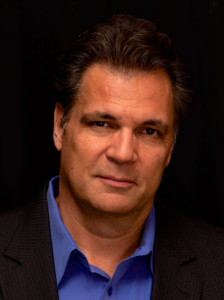Christian Business Association of the Palm Beaches hosted their April meeting at Farmer’s Table in North Palm Beach. The speaker for the meeting was New York Times best selling author, TEDx speaker, historian and Senior Fellow of Public Leadership at Palm Beach Atlantic University, Dr. Stephen Mansfield.
Mansfield earned a bachelor’s degree in history and philosophy from Oral Roberts University in 1981, a master’s degree in history and public policy from Abilene Christian University, and a doctorate in history and literature from Whitefield Theological Seminary in 1996.

He began his career as a pastor, serving the church for over twenty years, ten of which were served at Belmont Church in Nashville, Tennessee. He then began devoting his time to writing.
He has written over thirty books, primarily cultural and historical books, including The Faith of George W. Bush, The Miracle of the Kurds, Character and Greatness of Winston Churchill: Hero in a Time of Crisis, Mansfield’s Book of Manly Men, and Ten Signs of a Leadership Crash.
His talk at CBA was on Ten Signs of a Leadership Crash.
Dr. Mansfield said that business schools are starting to realize the damage that the personal life events of leaders can have on a company. He was running a firm that gained a reputation for handling leadership failures: damage to a brand, an arm of the military, a church, or a sports team caused by the fall of its leader.
He thought if he could dissect the signs that precede a leadership crash, leaders would be able to recognize signs of impending problems. He looked at the “post mortem” of a leader’s fail and detailed the “soft factors” involved.
Quietly, behind the scenes of the organization, like termites, the factors that lead to the demise of an individual are almost imperceptible.
Being out of Season
Dr. Mansfield explained that part of the reason leaders crash has to do with the season of a work life. Using “Larry” as an example, he described a man who had been looking forward to retiring. Larry and his wife made a commitment to pursuing their “side hustle” of pottery and enjoying their grandchildren. Instead, Larry was presented with a lucrative offer to assist in fixing a problem in Indonesia before retiring. He blew past he and his wife’s plan to retire and took the position. He was tired. Things weren’t going well. He started over-striving and working late. He started drinking. He starting talking to the attractive assistant who was working late with him. Before long he was involved in an affair with her. He proceeded to do some things that were illegal and almost got arrested. Larry ended his career in shame. Why? Because he blew past a season.
Choosing Isolation
Dr. Mansfield explained his personal tendency towards introversion. He looks forward to getting by himself, headphones blocking the rest of the world out. He loves people, engages with them, but also cherishes his solitude.
But when we are doing something wrong—when we are hurt, ashamed, bitter, we isolate. One of the signs of a leadership crash is unhealthy isolation. He advises having accountability partners who will ask if you are connecting with people.
He gave an example of Charlie Sheen, who began isolating, drinking, and doing drugs. Even though Sheen had a close, connected Catholic family, he pulled away from them, and thus removed the support system that could have helped prevent his crash.
Defining Episodes of Bitterness
All of us have been hurt, but not all of us surrender our souls to it. Not all of us have a stronghold of bitterness and anger. Hebrews 12 speaks of bitterness as a poison.
Make sure that no one falls short of the grace of God and that no root of bitterness springs up, causing trouble and by it, defiling many. Hebrews 12:15 HCSB
Bitter people are hard to be around. Dr. Mansfield spoke of Richard Nixon and the bitterness he held onto from his childhood when the townspeople mistreated his Quaker family. Historians now recognize the unresolved bitterness that defined and tainted Nixon’s life.
We do not see ourselves accurately except through the feedback of others.
Evading Confrontation
Dr. Mansfield brought up a colossal failure of confrontation that happened at Penn State, when former football coach, Jerry Sandusky, was convicted of molesting children. Signs of his abuse were pervasive but ignored for years. The experience was devastating to the boys he molested and their families, to the school, the football players, the president of the school, the faculty, the students and the alumni.
Sandusky said during the court hearing, “No one. Ever. Confronted me about child abuse.”
Leaders and their companies must create a culture where low level confrontation conversations are standard.
Mansfield said, “We do not see ourselves accurately except through the feedback of others. Confrontation from a Band of Brothers will save your soul. Have the low level, healthy confrontations.”
Losing Trusted Friendships
Always, before a leadership failure, friendships suffer. If you’re thinking about doing something wrong, drinking too much, self-medicating, having an affair, whatever it is, you start pulling away from friends.
We tend to be awash in the sea of casual relationships.
In the triage of a post-fail, one of the first things Mansfield does is bring together the closest friends of this person. To surmise a plan of action, over a meal with these friends, he opens a conversation about what happened.
Dr. Mansfield shared a quote about Tiger Woods. “Tiger lost his father. He lost his management. He pushed away his friends and was left only with misbehaving influences…Then he lost his soul.” ESPN
“Why? Because Tiger pushed away everything that gave his life balast,” Mansfield said.
The issue of friendships are important. Mansfield asked, “Do you have good friends? Have you empowered them to speak about what’s going on in your life? Do you welcome input or are you distancing your friends.”
Mansfield said, “We tend to be awash in the sea of casual relationships.”
Forgetting Fun
“All people, especially leaders, need to have planned distractions and fun in their lives,” Mansfield advised, “Our leadership roles deform us. They depress us. They dry us out.”
“Uninspiring people don’t inspire,” Mansfield said.
Perpetuating an Artificial Image
In the business world we create our branding, or people create it for us. “One of the things that precedes leadership crashes,” Mansfield said, “is perpetuating an artificial image.”
He brought up a time when someone introduced him as “one of America’s greatest living authors.” He said that if he had tried to sit down to write with that kind of expectation, living under the pressure of trying to produce a work that fits that description, the words would have failed to flow.
He also brought up Jim Baker, whose dream blew up until “the box got bigger than the message,” and Baker had to raise a million dollars a day just to stay afloat. Baker later said in his book, “The image destroyed the reality.”
Serving the Schedule
Using the military as an example, he said that soldiers don’t mind doing what they have to do, but Post Traumatic Stress Disorder results when they can no longer attach the mission to what they do, day in and day out.
Change is necessary when you can no longer connect to the “why” to what you do.
Creating a Third World
Sometimes to escape the pressures of work, people create a “third world” for themselves: a place or interest to escape. Whether it’s an affair or anything in excess: food, alcohol, sports. Leaders who fail have frequently created a world in which they retreat to, to cope with stress.
Losing the Poetry
When you know God has called you to do what you’re doing—there is a poetry to it.
Dr. Mansfield talked about the man whom he and his wife hired to do brick work around his patio. When he had finished, the Mansfields looked out over the brickwork and teared up in awe of his work. The man explained that he fell in love with bricks when he was 16 years old and decided he was going to create art with bricks.
He told another story about a man who owned a plumbing firm who studied and earned his seminary degree. He said he wanted to be able to go into people’s homes and not be weird when he’s in the kitchen talking about his faith, and he wanted to train his people to do the same. Mansfield said that this plumber is as educated as most of our pastors. God gave him a poetry about what can happen in common conversations with people in their homes, on ordinary days, and he reaches thousands of people through his plumbing business.
Inspiration is the key to great leadership, great sales, and great achievements. Watch warning signs, keep good people close with open conversations, and keep the poetry that motivated you to start doing what you do.
Christian Business Association of the Palm Beaches meets the 2nd Friday of every month at Farmer’s Table in North Palm Beach. Registration is required.





